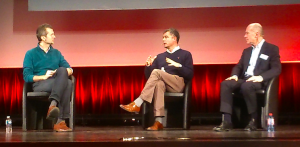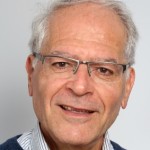By Pierre Nassif for Enlivening Edge
I was present at a conference in Paris with Frederic Laloux on January 13, 2016, at the “Cité des Sciences et de l’Industrie”. A gathering of 900 persons: executives of Teal or would-be Teal organizations, coaches, consultants. We left the place stronger than ever in our aim to change corporate life in our country.
A gathering of 900 persons: executives of Teal or would-be Teal organizations, coaches, consultants. We left the place stronger than ever in our aim to change corporate life in our country.
Frederic’s goal was to present his book Reinventing Organizations, recently published in a French translation. To those familiar with the book or Laloux’s previous presentations, it would be worthless to describe extensively the content of the conference. Let me then pick up some stories about less-widely-practiced parts of his message or about the event itself.
Buurtzorg is the preferred example of a self-managing organization made by Laloux in his book and speeches. It is a Dutch neighborhood nursing organization for elderly or disabled persons. It was successful with this form of organization to the extent that it took 70% of the market share in its country. These days Jos de Blok, its founder and CEO, gives free consultancy to his competitors about self-managing organizations.
Why is he doing so? Quite simple: he is serving the Evolutionary Purpose of his own organization, which is a greater autonomy at home for an old or disabled person. If his competitors are willing to serve the same purpose, he says that he has to provide them with adequate guidance when they ask for it.
“To have a purpose of real value and accept to listen to it at every step,” said Laloux on that day, before quoting Jos de Blok: “If one considers a company as a living organism with its own energy, its own direction, my role as a manager is to sense and answer. It is a much humbler role than to predict the future. It is simply to listen and try to understand where the organization wants to go.”
It happened once that two nurses at Buurtzorg were taking care of a lady who broke a knee at home. When they learned about it, the nurses felt so concerned that they investigated how this might have been avoided, for example by making elementary changes in the lady’s living room. They decided then to explore the general idea of prevention with the help of two occupational therapists they partnered with. Those experts trained their team (10 to 12 persons) and started to visit together the homes of their clients to see how to minimize risks with some easy fixes. They also showed them dangers and taught them correct preventive actions.
Highly convinced by the outcomes, they went to Jos de Blok and told him “This has to be generalized at Buurgzorg.”
He just answered “Why wouldn’t you simply tell your story in a couple of pages you would post in our Intranet. You would then provide a presentation to those interested in which you would have packaged your idea.”
They did it, and a year after, more than a half of Buurtzorg teams were “Buurtzorg +” which is how they branded the new service.
This happened just by letting the organization follow its own course. No strategic meetings, no product manager, no investment planning, no rollout. Simply the “laissez-faire” approach of self-management.
Later in the conference, Laloux admitted that he didn’t give many insights, in his book, about how to change an existing organization according to his ideas. He then gave the floor to Michel Sarrat, Chairman and CEO of GT Location (rental of trucks to the industry) and Sarrat’s coach, Christophe Le Buhan. With his support, Sarrat has implemented several important steps toward a self-managing organization in his company.

Sarrat told us the story. He gave no recipes and no evidence that anyone could do it the same way. The unique experience of Michel Sarrat occurred when he decided to transform the company after a difficult year in its life, the year 2011. Looking at the four last years, he expressed his gratefulness, his surprise, his amazement about what happened.
At 58, he decided that first he would do some psychotherapeutic work. “I had to revisit my fears, the memory of my childhood. Little by little, I came to terms with my reality, my weaknesses, my strengths. I felt my freedom growing.”
During that same period, he organized meetings on Saturdays with all of his company personnel: drivers, supervisors, managers – everybody was invited. He went from one subsidiary to the other one, doing a 10-minute speech and then listening for three and a half hours.
The year 2013 arrived, and Christophe asked him “Why wouldn’t you ask feedback from the entire staff?” He decided to involve all the approximately 140 people in the company who knew him in person.
He asked “What are you pleased with? What would you like me to change? What else would you like to say?” He got around 80 answers.
He tells us the matters he was challenged with. “The board of directors hinders the communication between you and us. You have no more than a part of the story and this part is itself distorted. You should be more daring. Look at what we are: imagine what we could achieve if you were just more daring.”
A decisive step was then taken when he appointed the HR manager to the position of innovation manager and decided that there would no longer be any HR manager: “They know their job. They don’t need any manager.” This was a turning point after which the whole company initiated its change, and is still changing.
He decided to disclose widely within the company, the outcomes of meetings of the board of directors. He did that by inviting people who were present in the building on that day, to an informal meeting. “We stay in the landing. They sit where they can, some of them in the staircase, and we say openly what happened in our meeting (except for matters as confidential as the takeover of some other company.) Lately we decided that this event will be video-recorded and published in our Intranet.”
They are currently changing the process of deciding on pay. “I will no longer decide on your pay”, Michel announced to the people who directly report to him. Then they had to discuss how to make such decisions. When this meeting was disclosed, the other people knew that this process would change for them as well. This is ongoing. We were impressed by the courage of Michel Sarrat and moved by the humanity of his tone when he told his story.
The moment came then for questions and answers.
“The organization will be liberated from hierarchy, but there will always be leaders, won’t there?”
“Isn’t this the introduction of some kind of democracy in corporate life?”
“Do you think that a governmental department could undertake such a change?”
“Which role remains to the managers in a self-managing organization?”
Frederic Laloux answered very kindly to those good questions that I will leave you with. We were so energized after his speech. He received a standing ovation.
Pierre Nassif, born 1949, is a career coach, writer, translator and journalist. He has an engineering graduation of Ecole Polytechnique (1972). He was an organization consultant, IT project manager and head of new services department for telecommunication operators.





